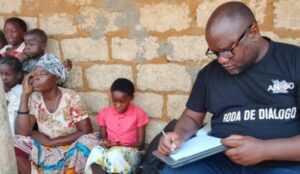As we journey with Aguchita for the fourth week in light of Pope Francis’ encyclical letter Laudato Si’: On Care for our Common Home, we continue to be enlightened, challenged, and inspired through Francis’ words and Aguchita’s life. This week, we reflect on Chapter Three of the encyclical: ‘The Human Roots of the Ecological Crisis’.
In this third chapter, Francis explores why we are where we are in our ecological crisis. He links the roots of the problem to technology, employment, and modern anthropocentrism and states that there can be no renewal of our relationship with nature without a renewal of humanity itself – warning of the danger of focusing exclusively on economic profit for the few while ignoring humanity’s search for meaning through work.
In discussing the need to protect employment, Francis writes:
We need to remember that men and women have “the capacity to improve their lot, to further their moral growth and to develop their spiritual endowments”. Work should be the setting for this rich personal growth, where many aspects of life enter into play: creativity, planning for the future, developing our talents, living out our values, relating to others, giving glory to God. It follows that, in the reality of today’s global society, it is essential that “we continue to prioritize the goal of access to steady employment for everyone”, no matter the limited interests of business and dubious economic reasoning.
Aguchita was aware that work was not simply a mechanical exercise; she paid great attention to its human dimension. She understood what it meant to invest in people. She did not empower girls and women to work only to achieve short-term financial gains. Instead, through a creative approach rooted in values and prayer, she supported girls and women to develop their talents and plan for their future. She may not have talked about ‘integral ecology’, but she clearly took a holistic approach to employment, which sought to incorporate some of the political, social, economic, and environmental problems encountered by the girls and women in her care.
Today, Francis calls upon us to adopt this holistic approach to tackle the human roots of the ecological crisis. Learning from Aguchita’s example, what steps can you take to respond to this call?








